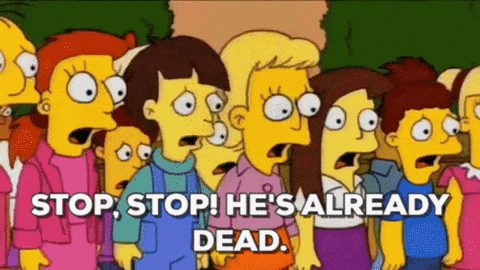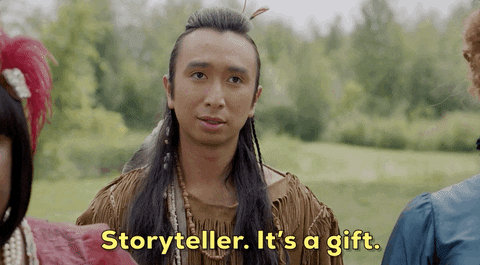What if “Telling Stories” on Substack Can Heal You?
Maybe you were too much for your young brain to understand, so now that you have the capacity to figure things out, you're catching up. That's okay and not your fault at all.
Hi! I’m Miao and I overthink, overshare, overflow. Writing is a constant companion, whether it’s a creative release, a culmination of research, or a conscious effort to emulate someone else. I love to string words together. When the mood hits me, I also love communing and creating with brown women here at Unspoken. If your mood, on the other hand, should permit clicking the subscribe button—know that it would mean a lot. Subscribing tells us that you care about what we have to say. What a concept!
Let me tell you a story about how Substack healed me. When I was a child, I wanted to be a storyteller. At first, not really for an audience. I savored the process of weaving a story from my imagination and sometimes my observations of the world at the time. Feeling it come to life as I wrote it down was a special kind of magic—probably the first kind of spell I’d identify and try to replicate. In those moments, I was transported to different worlds and could be anyone I wanted to be.
But as I got older, sharing my stories with others became more appealing. I loved the idea of bringing joy or inspiration to someone through my words. It wasn’t about fame or recognition but rather the connection that storytelling creates between people. I didn’t want to talk about myself, but I also kind of did. Does that make sense? It felt like it healed me every single time I made a positive connection with someone through my words.
Going Back to the Basics
For some people, “telling stories” means spinning completely made-up tales. And while that can certainly be entertaining, it’s not the only way to tell a story. As I’ve gotten older, I’ve realized that some of the most powerful stories are based on real-life experiences and emotions.
When I wrote songs and performed them in front of audiences in the Philippines, I rarely recorded or shared tracks that felt too personal. I didn’t want to let anyone in, and I believe the people listening felt that. Those feelings got in the way of that special kind of magic actually working to its completion. Storytelling is your perspective transformed into a consumable format. When you’re not honest about your perspective, it affects that transformation and the frequency at which people can tune into it. To create an authentic connection with your audience, you need to be completely honest about who you are.
Getting to Know Yourself
We all have stories to tell. Whether it’s a personal experience or a fictional tale, we are constantly sharing our perspectives with others through storytelling.
But how well do you really know yourself? You need to understand who you are to create authentic and meaningful connections with someone. That’s true for everyone, but for storytellers, even more so. Looking inward and exploring your thoughts, feelings, and experiences is important. By doing so, you can tap into your unique voice and perspective that will not only make your stories stand out—if that’s even something you aim for—but also make your connections with others deeper and more genuine.
Getting to know yourself requires a level of introspection that can sometimes be uncomfortable. You may uncover parts of yourself that you didn’t know existed or confront aspects of your identity that you’ve been avoiding. I learned this firsthand when my brain (and heart) could find no other way to work through my Dad’s passing than through writing about it. It was uncomfortable to express my feelings in writing, as I didn’t even discuss them with most people. But leaving those words up made them real and tangible, and increased the urgency I felt to process and deal with them.
Learning How to Communicate Effectively
What if “telling stories” was code for “learning how to communicate effectively”? As you explore your identity, you learn to express yourself clearly and connect with others through your shared experiences and struggles. That’s where the healing power comes from.
Through storytelling, you learn how to listen and empathize with others. You learn to speak from your perspective but still consider different perspectives and challenge your biases. You become more open-minded and understanding.
Yapping to Listen in and Find Out Who You Are
Most people don’t need to yap. Some may not even need to write their feelings down in their Substack or their personal journal. But—and neurodivergents, please back me up here—sometimes talking about something with someone or even just saying the words out loud helps with processing an otherwise overwhelming amount of information.
Maybe you were too much for your young brain to understand, so now that you have the capacity to figure things out, you’re catching up. That’s okay and not your fault at all. That’s a perfectly valid pace. Life is not a race. You’re not in competition with anyone. Go find out who you are, and let everyone else know while you’re at it. Say it loud!
Telling Stories and Healing Yourself
We all have stories to tell—some are happy, some are sad, and others may be full of pain and struggle. But no matter what your story is, it’s a part of who you are. That’s your voice, your perspective, your own very particular niche.
Telling your own stories can be healing and empowering. It allows you to release emotions you might have been holding onto and helps you make sense of your experiences. It also gives you the opportunity to share your unique perspective with others, which can inspire and connect you with others who may have had similar experiences.
Being Part of a Community
I’ve published more than 120 pieces on Substack, and I still have a lot more to say. How can that be? How can you sustain “telling stories”?
Community is the real secret to how Substack healed me. Healing is connection is care is community. Telling stories is good for your community, and your community is good for your stories. If you don’t participate in a community, where would your stories come from? Who would listen to and benefit from them?
Sometimes, you don’t even need encouragement to start speaking up. All you need is a platform—and here it is.
Photo by Etienne Girardet on Unsplash








Thank you so much for these pertinent reminders! This was a beautiful piece. Story-telling has been such an important part of my own healing journey. I think you would be very intrigued by Viktor Frankl's "Man's Search for Meaning". I highly recommend!